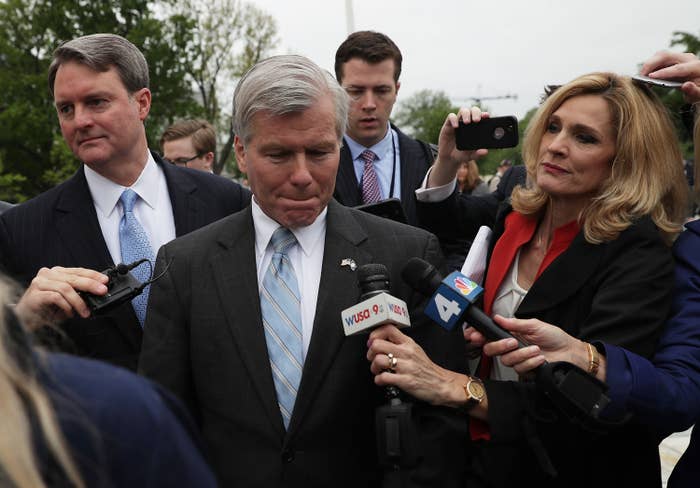
WASHINGTON — Supreme Court justices on Wednesday appeared likely to overturn former Virginia Gov. Bob McDonnell's corruption conviction, although it was not clear the reasoning they would use for doing so.
Justice Stephen Breyer took the lead in questioning on Wednesday, warning that the case — with underlying facts involving a Ferrari ride from a vacation home to Richmond and a tobacco-based dietary supplement — could give "dangerous" powers to "virtually uncontrollable" prosecutors to pursue charges against public officials.
The case, Breyer said, presents "as fundamental a real separation of powers problem as I've seen."
The former governor was convicted for violating the federal honest-services fraud statute following an indictment for his role in a bribery scheme with the head of Star Scientific, a Virginia-based company that was promoting Anatabloc, a dietary supplement. McDonnell and his wife accepted more than $175,000 in money and luxury goods from Jonnie Williams, Star Scientific's CEO. In return, the government argued and a jury agreed, McDonnell agreed to use "the power of his office to help Williams's company."
After his conviction was upheld on appeal by the 4th Circuit Court of Appeals, McDonnell asked for and received a stay of his sentence pending Supreme Court action on his case — a move that allowed him to attend Wednesday's arguments at the Supreme Court.
The conviction and question before the Supreme Court — and the concerns raised by Breyer — related to the definition of "official acts" under the statute and an underlying bribery statute. The former governor's lawyers argue that the instructions given to the jury about the definition of "official acts" — the definition advanced by the federal government — was too broad.
The U.S. government argues that "official act" includes "any action on a matter within the scope of a public employee's official duties, including the exercise of influence on decisions made by others."
McDonnell's lawyer argued Wednesday that such a definition is unworkable — and many members of the Supreme Court appeared to agree, at least in part.
"In order to engage in 'official action,' an official must either make a government decision or urge someone else to do so," McDonnell attorney Noel Francisco argued. "The line is between access to decision-makers on the one hand and trying to influence those decisions on the other."
Later, when questioning Deputy Solicitor General Michael Dreeben — in his 100th argument before the justices — Breyer laid out his concerns about the government's position again.
"I say that is a recipe for giving the Department of Justice and the prosecutors enormous power over elected officials who are not necessarily behaving honestly," he told Dreeben, adding: "I am looking for the line that will control the shift of power that I fear."
Dreeben countered that it is McDonnell's argument "is a recipe for corruption," allowing public officials to require "paying for access" — so long as those officials "do[] not put a thumb on the scale of justice." Later, in response to a question from Justice Ruth Bader Ginsburg, Francisco acknowledged that his position was that such an action might be illegal for other reasons but would not be illegal under the bribery statute.
Further still, McDonnell's lawyers argue that, if the government's understanding of "official acts" is right, then the law itself is unconstitutionally vague — a point picked up in Wednesday's arguments by Chief Justice John Roberts.
When Dreeben suggested it would be "absolutely stunning" for the court to hold that bribery and corruption laws "on the books since the beginning of this nation" are unconstitutionally vague, Justice Anthony Kennedy shot back: "Would it be absolutely stunning to say that the government has given us no workable standard [for defining 'official act']?"
Even Justice Elena Kagan, who was skeptical in her questioning of Francisco in the first part of Wednesday's arguments, pressed back hard against her former colleague in the Solicitor General's Office when Dreeben attempted to defend the McDonnell prosecution and conviction.
"[T]his might have been perfectly chargeable," Kagan said of the overall bribery scheme alleged in the indictment, "but I guess I'm troubled by these particular charges and instructions," which she said "seems to make every piece of evidence" into an "official act," rather than focusing on the ultimate goal of getting the university to engage in testing the Anatabloc.
The court is expected to issue a decision in the case by the end of June.
